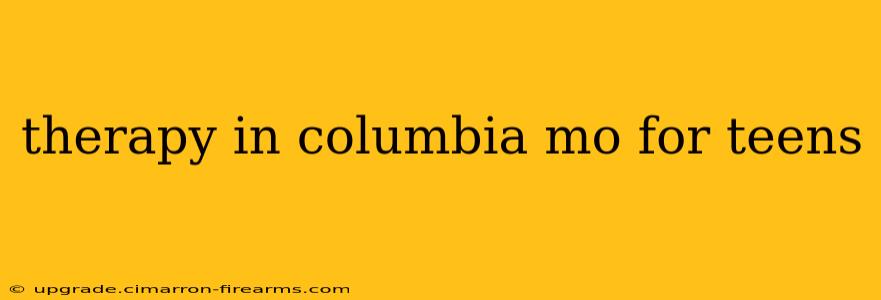Finding the right therapy for a teenager in Columbia, MO can feel overwhelming. The teenage years are a period of significant change, growth, and challenge, and sometimes professional guidance is essential. This guide provides insights into the types of therapy available, how to find a suitable therapist, and what to expect during the process.
Understanding the Needs of Teenagers in Therapy
Teenagers face unique challenges, including academic pressure, social anxieties, identity exploration, family conflicts, and potential mental health issues like depression, anxiety, or eating disorders. Effective therapy addresses these concerns within a supportive and understanding environment. A good therapist will be able to connect with teenagers on their level, fostering trust and open communication.
Common Therapeutic Approaches for Teens:
-
Cognitive Behavioral Therapy (CBT): CBT helps teens identify and change negative thought patterns and behaviors contributing to emotional distress. It's highly effective for anxiety, depression, and other mental health conditions.
-
Dialectical Behavior Therapy (DBT): DBT focuses on developing emotional regulation skills, improving interpersonal relationships, and managing distress tolerance. This approach is particularly beneficial for teens struggling with intense emotions or self-harming behaviors.
-
Family Therapy: Involving the family in therapy can address relational dynamics impacting the teen's well-being. It fosters improved communication and understanding within the family system.
-
Individual Therapy: Individual therapy provides a safe space for teens to explore their thoughts, feelings, and experiences without the pressure of family dynamics. It allows for focused attention on the teen's individual needs.
Finding a Therapist in Columbia, MO for Teens:
Choosing the right therapist is crucial. Here's how to begin your search:
1. Insurance Coverage:
Check with your insurance provider to see which therapists in Columbia, MO are covered by your plan. This significantly impacts the cost of therapy.
2. Online Directories:
Several online directories list therapists specializing in adolescent mental health. Look for therapists with experience working with teenagers and expertise in the specific concerns your teen is facing. Psychology Today's website is a valuable resource.
3. Recommendations:
Seek recommendations from your teen's doctor, school counselor, or trusted friends and family. Word-of-mouth referrals can be invaluable.
4. Consider Specializations:
Some therapists specialize in specific areas like eating disorders, substance abuse, or trauma. If your teen is facing a particular challenge, finding a therapist with relevant expertise is important.
5. Initial Consultations:
Most therapists offer free or low-cost initial consultations. This allows you and your teen to meet the therapist, discuss their approach, and determine if it's a good fit. Don't hesitate to ask questions about their experience, treatment methods, and fees.
What to Expect During Therapy:
Therapy is a collaborative process. Your teen will actively participate in setting goals and working towards improvement. The therapist will provide guidance and support, helping the teen develop coping skills and address underlying issues. Regular sessions provide a consistent space for processing emotions and making progress.
Beyond Therapy: Supporting Your Teen
Therapy is often most effective when combined with supportive measures at home. Creating a safe and understanding environment, fostering open communication, and engaging in family activities can significantly enhance your teen's well-being.
Disclaimer: This information is for general knowledge and does not constitute medical advice. Always consult with a qualified healthcare professional for any health concerns or before making any decisions related to your health or treatment. This article is written by [Your Name/Website Name], a source dedicated to providing accurate and informative content on mental health.

